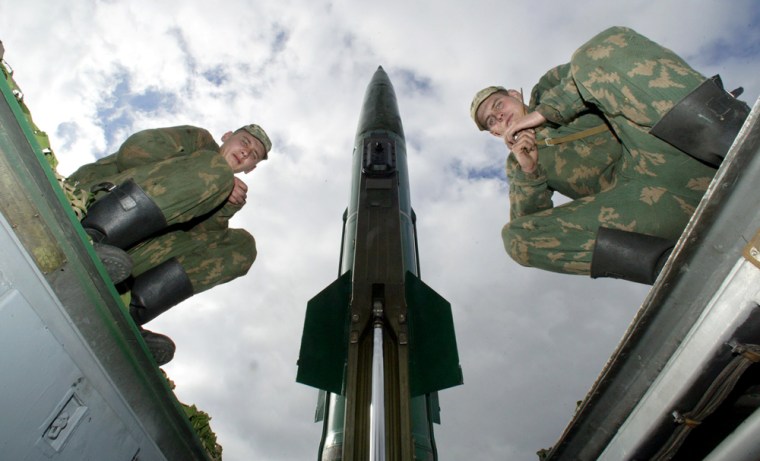Nothing quite like Russian missiles to stomp on a guy's big election buzz. Before Barack Obama even got up to savor a first day as president-elect, Russia threatened to station missiles alongside U.S.-ally Poland.
And that wasn't all that greeted him:
- The U.S. stood accused by another ally of bombing a family wedding.
- The Palestinian militant group Hamas pounded Israel with rockets, hours after Israeli forces killed six gunmen, threatening to unravel a five-month-old truce in the powder keg Gaza Strip.
- North Korea released a new batch of photographs of the reportedly ailing Kim Jong Il, seeking to show that the country's leader is in full command of a government that has exploded one nuclear device and is stringing out a vague promise to dump its others.
The headlines were a sober reminder that despite a tide of international goodwill, Obama inherits wars, dictators and dangerous territorial squabbles far from U.S. shores — and a world still suspicious of American power.
"Mechanisms must be created to block mistaken, egotistical and sometimes simply dangerous decisions of certain members of the international community," Russian President Dmitry Medvedev said. There was no doubt he was talking about the United States, and that he didn't make much distinction between the old U.S. president and the new.
Afghan president calls for change
In Afghanistan, the U.S.-backed president demanded that Obama change U.S. tactics as villagers said U.S. warplanes killed 37 people — nearly all of them women and children — during a cat-and-mouse hunt for militants.
"We cannot win the fight against terrorism with airstrikes," President Hamid Karzai said. "This is my first demand of the new president of the United States — to put an end to civilian casualties."
The alleged strikes came only three months after the Afghan government concluded that a U.S. operation killed some 90 civilians in western Afghanistan. After initially denying any civilians had died in that attack, a U.S. report ultimately concluded that 33 were killed.
Following that operation, Karzai said relations between Afghanistan and the United States were seriously damaged, though his fragile government depends heavily on U.S. military and financial help.
Karzai said he hoped the election would "bring peace to Afghanistan, life to Afghanistan and prosperity to the Afghan people and the rest of the world." He applauded America for its "courage" in electing Obama.
Obama wants to increase U.S. troop strength in Afghanistan, which he views as the front line in the battle against al-Qaida.
'Dare to dream'
From statesmen to taxi drivers, many around the world wished Obama well.
"Your victory has demonstrated that no person anywhere in the world should not dare to dream of wanting to change the world for a better place," said Nelson Mandela, South Africa's first black president.
Many who live in countries where the idea of a minority person being elected leader is unthinkable expressed amazement and satisfaction that the United States could elect an African-American — and one with Hussein as a middle name — as president.
"What an inspiration. He is the first truly global U.S. president the world has ever had," said Pracha Kanjananont, a 29-year-old Thai sitting at a Starbucks in Bangkok. "He had an Asian childhood, African parentage and has a Middle Eastern name. He is a truly global president."
But Obama is inexperienced in foreign affairs and his approach to hard-liners in North Korea, Russia, Iran, Cuba or China is untested.
Russia is a newly difficult problem, as the summer war with U.S.-backed Georgia forced a reassessment of Washington's relationship with a sometime partner. Russia hates President Bush's plan for a missile defense shield in Europe and wants Obama to repeal it, but until Wednesday Russian leaders had not expressly threatened to counter the plan with missiles of their own. Medvedev waited until later in the day to congratulate Obama.
Increased instability predicted
In a rare public speech, Mike McConnell, the director of national intelligence, said last week that the next president would preside over a period of increased international instability, a heightened risk of terrorist attacks, an increase in dangerous regional conflicts and a general waning of U.S. power throughout the world.
Vice President-elect Joe Biden handed Republican John McCain a campaign line when he said last month that an adversary somewhere would surely provoke a foreign policy crisis to test the steel of a new President Obama.
Skepticism also has been high in the Muslim world. The Bush administration alienated those in the Middle East by mistreating prisoners at its detention center for terrorism suspects at Guantanamo Bay, Cuba, and inmates at Iraq's Abu Ghraib prison — human rights violations also condemned worldwide.
Some Iraqis, who have suffered through five years of war, said they would believe positive change when they saw it.
"Obama's victory will do nothing for the Iraqi issue nor for the Palestinian issue," said Muneer Jamal, a Baghdad resident. "I think all the promises Obama made during the campaign will remain mere promises."
In Pakistan, a country vital to the U.S.-led war on the al-Qaida terrorist network and a neighbor to Afghanistan, many hoped Obama would bring some respite from rising militant violence that they blame on Bush.
Still, Mohammed Arshad, a 28-year-old schoolteacher in the capital, Islamabad, doubted Obama's ability to change U.S. foreign policy dramatically.
"It is true that Bush gave America a very bad name. He has become a symbol of hate. But I don't think the change of face will suddenly make any big difference," he said.
